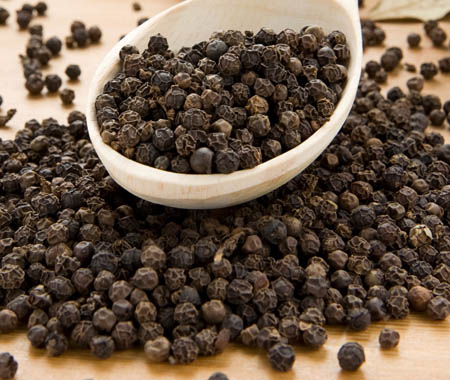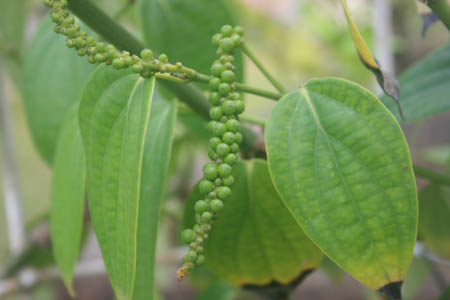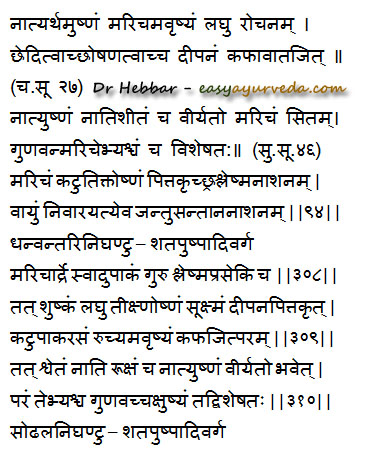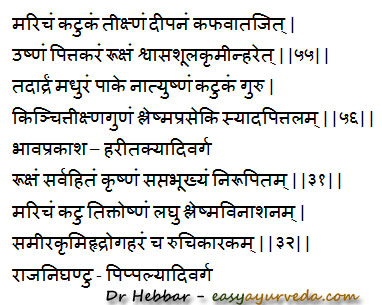Black Pepper- Piper Nigrum Benefits, Usage Dose Side Effects
Black pepper has not got its well deserving credit. It certainly is not just another spice. It removes toxins , heals, stimulates organs. It is also used as an antidote in insect bites. It is one among the three ingredients of very important Ayurvedic medicine – Trikatu.
Botanical Name- Piper nigrum Linn.
Family- Piperaceae (Pippali kula)
Table of Contents
Vernacular Names
Hindi Name – Kalimirch, Mirch, Gulmirch, Golmirch, Choco mirch.
English Name- Black Pepper, Common Pepper, Pepper
Persian Name – Filfile siyah, Pilpil, Filfile aswad
Arabian Name – Filfil aswad
Telugu Name- Miriyalu, marichamu, shavyamu
Bengali Name- Golmarich, Vellajung, Murichung, Kolukung, Muricha, Kala morich.
Tamil Name- Milagu
Marathi Name – Mirin, Kalamiri
Gujarati name – Kalamri, Kalamuri, Kalominch, Kalamire.
Kannada name – Kari Manesu, Kalu Menasu, Olle Menasu, ಕಾಳುಮೆಣಸು
Malayalam Name- Nalla muluka, Kurumulaku, Lada, Nallamulaku.
Konkani Name – Kare Menasu
Urdu name – Filfilsiyah, Kalimirch
Punjabi name – Galmirch

Medicinal properties
Black pepper – Medicinal Properties
Rasa (Taste) – Katu (Pungent)
Guna (qualities) – Laghu (lightness), Teekshna (strong, piercing), Sookshma – enters deep and minute body channels
Vipaka- Katu – Undergoes pungent taste conversion after digestion.
Veerya- Ushna – Hot potency
Effect on Tridosha – Balances Kapha and Vata
Properties as per Bhojana Kutuhala
According to Bhojana Kutuhalam as mentioned in the context of sambhara, Maricha is pungent and bitter in taste, hot in potency, light to digest, It helps in curing intestinal worms, heart diseases, improves taste perception, it alleviates kapha dosha and cures disorders caused due to vitiated vata dosha.
Health benefits
Black Pepper health benefits:
Na Ati Ushna – It is not very hot
Avrushya – It is anaphrodisiac
Ruchikaraka, Ruchya, Rochana – improves taste, relieves anorexia
Because of its Chedana (cutting) and Shoshana) drying effects, it increases digestion strength and balances Kapha and Vata Dosha
Pittakrut – Causes increase in Pitta.
Kaphahara – decreases sputum production.
Vayu Nivarayati – useful in Vata related disorders, bloating.
Kruminut, Jantu Santana Nashanam – Useful in intestinal worm infestation.
Shwasahara – useful in treatment of asthma and chronic respiratory disorders.
Hrudrogahara – useful in cardiac disorders
It is used in treating recurrent fever – Vishama Jwara
It is one among Pramathi herbs – It has scraping effect over the intestines, inducing cleansing effect.
It is orally used in women with amenorrhoea to induce periods.
Black pepper extract relieves fat deposition by blocking fat cell formation. Hence, very useful in obesity management.
Fine powder of pepper (Piper nigrum) is administered in the dose of 1-2 gram, along with honey or betel leaf juice is used in chest congestion due to phlegm.
Wet black pepper
Wet black pepper is sweet in taste, Sweet Vipaka,
Guru – heavy to digest
Shleshmapraseki – increases Kapha Dosha.
Apittala – does not increase Pitta Dosha.
White variety is not very hot in potency.
Na Ati Rooksha – not very dry. Other than these two qualities, it is quite similar to black variety.
It is also Chakshushya – good for eyes.
Part used, dose
Part used- Fruit, Dried Unripe Fruits, Known As Peppercorns
Black pepper Dose- powder – 250 mg – 2 grams in divided doses per day.

Sanskrit verse


Use in diet
How to use black pepper in your daily diet?
Use as single ingredient along with honey or ghee – dose – up to 2 grams per day
Sprinkle over soups
Add it to fruit juices – nullify Kapha dominant effect of sweet fruits
Add it as a substitute for chili.
Add it to veg smoothies, sabji, etc.
External application
- Black pepper is used externally in the form of paste and cream since the time of Charaka Samhita (Reference: Charaka Sutrasthana 3/12)
- The pepper fruit powder, made a paste with water and applied to improve blood circulation.
- The pepper oil is used in liniments for heat generating effect (rubefacient). It helps to produce a counter-irritant effect thereby, diverting the concentration of the patient from the pain.
- Oil is also used in treating leucoderma, eczema, and itching skin disorders.
- The black pepper powder is used as an ingredient in herbal tooth powder combinations such as Dashana Samskar Churna for its pain relieving and scraping effects.
- Hair loss caused due scalp ringworm can be treated by applying black pepper, along with onion and salt. This can be also applied in headache.
- Pepper decoction is used to gargle in tooth pain.
Research
Black Pepper’s role in fighting fat deposition
Anti cancer effect
Anti Oxidant effect
Anti bacterial activity
Other activities well established based on research:
Anti bacterial
Anti-Colon toxin,
Antidepressant – Depression is usually due to low Pitta. Because black pepper can increase Pitta, it acts as a stimulant to both mind and body.
Anti-fungal,
Antidiarrheal,
Anti-inflammatory,
Antimutagenic, Anti-metastatic activity, Antitumor – a very potent spice with lot of potential in cancer treatment
Antispasmodic – useful in abdominal pain relief
Anti-thyroid -> hyperthyroidism
Ciprofloxacin potentiator
Gastric ailments,
Hepato-protective
Insecticidal activity
Black pepper home remedies
- Ghee + Trikatu (Ginger, black pepper, long pepper)+ rock salt, black salt and bida salt – Useful in vomiting due to Vata Dosha increase. Cha. Chi. 20/23-25
- In dysentery, fine black pepper is given with asafoetida and opium.
- In cough, pepper powder is given with honey and ghee.
- In chronic colds, pepper is used with jaggery and curd.
Side effects
Piper nigrum side effects:
Because of its hotness, it increases Pitta. Hence, it needs to be used carefully in people with gastritis, burning sensation and sensitive stomach.
Because of its Avrushya – anaphrodisiac effect, it needs to be used in less quantities or its long term usage is best avoided in men with infertility problems.
Pitta dominant people may face black pepper allergy in the form of vomiting, diarrhea, abdominal cramps, watery eyes etc.
Excess consumption of pepper can cause abdominal pain, vomiting, burning sensation in bladder and while urination, urticaria etc
It can be taken in moderate quantities during pregnancy, lactation and in children.
Interaction with medicines, supplements
Can this be used while taking Homeopathic medicine?
Yes. This product does not react with homeopathic medicine.
Can this medicine be continued while taking supplements like multivitamin tablets, Omega 3 fatty acids etc?
Yes. Generally, this product goes well with most dietary supplements. However, if you are taking more than one product per day, please consult your doctor for an opinion.
With western
medicines
Seek your
doctor’s advice if you are taking this product along with other western
(allopathic / modern) medicines. Some Ayurvedic herbs can interact with modern
medicine.
If both Ayurvedic and allopathic medicines are advised together, then it is
best to take Allopathic medicine first, wait for 30 minutes and then take the
Ayurvedic medicine.
Effect on sperm quality, quantity
Effect of Black pepper and sperm quantity and quality:
Effect of oral administration (25 and 100 mg/kg body wt/day, for 20 and 90 days) of fruit powder of Piper nigrum L. on male reproductive organs of mice was investigated. In mice treated with 100 mg dose for 90 days, degenerative changes were observed in all the tubules. Percentage of affected tubules in testes of Piper-treated mice was dose-and duration-related. Further, Piper nigrum treatment for 20 days did not cause appreciable alterations in histological appearance of the epididymis, while the treatment for 90 days caused detectable alterations in the duct. The treatment also had adverse effects on sperm parameters, levels of sialic acid and fructose, and on litter size. (1)
Effect on hyperthyroidism, diabetes
Effect of black pepper on hyperthyroidism and diabetes:
Piperine alkaloid forms 5 – 10 % of chemicals of black pepper. It was evaluated for its thyroid hormone and glucose regulatory efficacy in adult male Swiss albino mice. Its daily oral administration (2.50 mg/kg) for 15 days lowered the serum levels of both the thyroid hormones, thyroxin (T (4)) and triiodothyronine (T (3)) as well as glucose concentrations.
The decrease in T (4), T (3) concentrations were comparable to that of a standard antithyroid drug, Proylthiouracil (PTU). It appears that the action of P. nigrum on thyroid functions is mediated through its active alkaloid, piperine. We also suggest that a higher dose of piperine may inhibit thyroid function and serum glucose concentration in euthyroid individuals. (2)
Effect on Asthma
Black Pepper for Asthma – A reader’s experience:
My sister has been suffering from Asthma for 40 years. On the advice of one of my bengali friends I suggested she take two black peppers in the morning empty stomach with hot water / milk for three months. Then leave it for 15/30 days and again start.
My sister got a wonderful result. She was on an inhaler for 15/20 times in a day which comes to one/two. That’s because they are in Kolkata ,a humid place. Even in the rainy season she didn’t feel troubled. Gap in between is very important.
Use in post partum care
Black pepper in post partum care
In every herbal remedy given to the new mother, black pepper is added.
This is to control Vata Dosha aggravation that naturally occurs post-delivery.
It is anti-toxic – prevents postpartum sepsis, infections.
It prevents cold, cough and other Kapha related problems that may occur in the mother.
Use in toxicity
Maricha to nullify toxicity:
Vatsanabha – Aconitum ferox is added with 1 part of Shuddha Tankana (borax) and 2 parts of Maricha (Black pepper) and triturated.
This is the second method of Visha Marana.
In most cases of toxicity due to usage of tubers, black pepper is used
Chemical constituents
Piper Nigrum Chemical Constituents
Piperine – 5 – 10 % – present both in white and black pepper
Piperethine, Piperolein A,& B, feruperine, Dihydroferuperine, Citronellol, Cryptone, Dihydrocarveol,a-b acid, Piperonal, Camphene, B- Caryophyllene, B- alanine, Pipecolic.
(Reference: Illustrated Dravyaguna Vijnana, Vol. II, by Dr JLN Shastry)
vitamins A, C, E, K, niacin and β-carotene; and traces of minerals such as iron, calcium, phosphorus.
Varieties, distribution
Different varieties of Maricha:
There are two varieties viz. black and white varieties(processed and Unprocessed) available at present.
Black Pepper:
Black pepper is produced from the green unripe drupe (unripe fruit) of the pepper plant. The unripe fruits are cooked in water for a few hours, Sun-dried or machine-dried for many days, during which pepper gains black wrinkled skin. Then it is called black peppercorn. Some people dry the unripe fruit without boiling it. Such black peppercorn can be used to extract essential oil or in medicines.
Green pepper: Is produced from green unripe fruit, wherein, it is not dried with heat exposure. It is freeze-dried or using Sulphur dioxide.
White pepper: White pepper consists of the seed of the pepper fruit. The dark colored skin is removed from it.
Orange and red pepper: Are prepared from ripe pepper fruits, preserved in vinegar.
Morphology, Distribution
Morphology
Piper nigrum is a perennial vine. Leaves are simple, alternate, oval, leathery, the upper surface is dark green and whitish green below. Flowers are greenish yellow arranged in a spiral along the spine. Fruit is an oval drupe, green in color, then becomes yellow to red and finally turns black color. Fruit contain a seed.(a)
Distribution- Cultivated in Sri Lanka, Malaysia, Indonesia.
In India – hills of south- western India. Cultivated in Assam, Karnataka, Maharashtra and Kerala.
Sanskrit Synonyms
Ushana – Pungent in taste, hot in potency
Krishna – Black coloured fruits
Suvrutta – spherical fruits
Shakanga, Vantari, Dharmapattana,
Shirovrutta, Kolaka,
Vellaja,Vallija – grows in a climber plant.
vrittaphala – Round fruit
Tikshnam – Having sharp qualities
Viram – Strong potency
Dharmapattanam – Maricha is stored in pots as an item to export to different countries
Kolam – Commonly stored in pots to export
Maricha –
म्रियन्ते जन्तवो अनेन इति इत्यर्थ:॥ भाव. नि.
mriyante jantavo anena iti ityartha:|| bhāva. ni.
Useful in relieving (killing) intestinal worm infestation.
Krishna –
कृष्ण वर्णं अथवा कर्शति कफं, शरीरं च कृशयति, कृश विलेखने ॥ रा. नि.
kṛṣṇa varṇaṃ athavā karśati kaphaṃ, śarīraṃ ca kṛśayati, kṛśa vilekhane || rā. ni.
Black colored fruits, decreases body weight, has a scraping effect.
Yavaneshta –
यवनेष्ट – यवनानां इष्टं, प्रियम् | yavaneṣṭa – yavanānāṃ iṣṭaṃ, priyam |
has great demand from western countries
Classical categorisation
Classical Categorisation of Maricha:
Charaka-
Deepaneeya – Group of herbs that increase digestion strength.
Shoolanut, Shoola Prashamana – Group of herbs useful in pain, abdominal colic,
Krimighna – de-worming group of herbs
Shiro Virechanopaga – Group of herbs useful in expelling Doshas from head and neck.
Susruta- Pippalyyadi, Trayushana
Vagbhata- Pippalyadi, Trayushana
Bh P. Ni – Haritakyadi varga
Adulterants
Vidanga
Substitute
Piper longum
Piper attenuatum
Piper brachystachyum
Ayurvedic medicines
Ayurvedic medicines with Black pepper as ingredient:
Trikatu Churna – used in treating obesity, cold, cough, indigestion and skin disorders
Chandraprabha Vati – Ayurvedic tablet used in treating liver disorders, urinary tract infections, semen defects, gynecological infectious disorders.
Marichadi Vati – used in respiratory disorders.
Tribhuvana Kirti Rasa – used in treating fever.
| Formulation | Indication | References |
| Marichadi churna | Agnimandhya,grahini | CS, Si, 15-108 |
| Swetamarichadi churna | Sarpavisha | CS, Ci 23-193 |
| Marichadi churna | Kaasa | CS, Ci 18-180 |
| Marichachurna and madhu | Kaasa | SS.U 52-21. |
| Marichadi churna | Apataanaka | SS, Ci 518 |
| swetamarichaadichurna | Eye diseases | SSU. 11-13, 16, 12-51 |
| Trikatu Churna | Sthoulya , swasa | AS.Su.12-48. |
| Dashamoolakatutrayadi kashaya | Swasaroga | AH |
| Maricha and dadhi | Netraroga | AH.U 13-34. |
| Shanmakshika yoga | Netraroga | AH.U 13-44 |
| Ksharaadi churna | Gulma, udararoga | BNR 5th part pg. 635 |
| Baranangyaadi lehya | Swasa, kaasa, hrudroga, gulma | BNR 5th page 281 |
| Shothaari rasa | Shotharoga | BNR. |
| Shuntyadi churna | Agnimaandya kantaroga | BNR pg. 269 |
| Kantakaaryavaleha | Swasa | BNR |
| Bootaankusharasa | Vatajakaasa | BNR pg 212 |
| Marichaadi gutika | API. |
Pepper, banana, raw
Taste – sour
Properties – light
Potency – hot
After digestion taste transformation ( Vipaka ) – sour
Effect on Doshas
Vata balancing (helps to maintain bone health)
Pitta increasing (promotes blood pressure, digestion, blood circulation)
Kapha balancing (used to prevent cancer)
Peppers, serrano, raw
Taste – pungent, bitter
Properties – light
Potency – hot (digestive)
After digestion taste transformation ( Vipaka ) – pungent
Effect on Doshas
Vata balancing (relief from sore muscles, arthritis pain)
Pitta increasing (causes sweating)
Kapha balancing (maintains cholesterol)
Peppers, ancho, dried
Taste – pungent, bitter
Properties – heavy (raw form poblano is light = helps lose weight)
Potency – hot
After digestion taste transformation ( Vipaka ) – pungent
Effect on Doshas
Vata balancing (has analgesic effect)
Pitta increasing
Kapha increasing (due to high nutrient concentration in dried form) (raw form, poblano is Kapha balancing (fights cancer)
Peppers, jalapeno, raw
Taste – pungent, bitter
Properties – light (can promote weight loss), dry (reduce abdominal fat)
Potency – hot (boosts metabolism)
After digestion taste transformation ( Vipaka ) – pungent
Effect on Doshas
Vata balancing (natural pain reliever)
Pitta increasing (due to hot potency and pungent taste)
Kapha balancing (promote weight loss)
Peppers, chili, green, canned
Taste – pungent
Properties – light, dry, sharp, piercing
Potency – hot
After digestion taste transformation ( Vipaka ) – pungent
Effect on Doshas
Vata balancing
Pitta increasing
Kapha balancing
Peppers, hungarian, raw
Taste – sour, sweet, pungent
Properties – light
Potency – hot
After digestion taste transformation ( Vipaka ) – pungent
Effect on Doshas
Vata balancing
Pitta increasing
Kapha balancing
Peppers, pasilla, dried
Taste – pungent, bitter
Properties – heavy (raw form is light = helps lose weight)
Potency – hot
After digestion taste transformation ( Vipaka ) – pungent
Effect on Doshas
Vata balancing (has analgesic effect)
Pitta increasing
Kapha increasing (due to high nutrient concentration in dried form) (raw form is Kapha balancing (fights cancer)
Systemic Action (Sthanika Karma)
External – It has a scraping effect on dhatus. External application of its paste and oil is indicated in Leucoderma, Pama (Type of skin diseases) etc. Also beneficial in painful inflammatory conditions. Anjana (Collyrium) of maricha with honey is indicated in eye diseases like Pterygium, Night blindness etc. Its paste or can be applied on gum and mouth in tooth ache, dental caries etc. Decoction is also beneficial in such conditions for mouth gargling.
Nervous System – Nerve stimulant, indicated in vataja rogas
Digestive System – Appetizer, increases digestive fire, stimulates salivary gland, Liver stimulant, Facilitate movement of vata dosha in normal direction, Anthelmintic. Indicated in loss of appetite, anorexia, constipation, Colic pain, abdominal distension, helminthiasis.
Circulatory System – Stimulate heart function, Indicated in functional defect of heart.
Respiratory System –Helps to eliminate vitiated kapha dosha from the respiratory passage. Indicated in chronic cough, rhinitis, breathing disorders etc.
Excretory System – Induce urine production indicated in dysuriaReproductive System – Indicated in Amenorrhea, impotency etc.
Skin – Stimulate sweat glands for sweat production, Indicated in various types of skin disorders.
Satmikarana – Helps to open up the body channels. It is included under the Pramadhi group of drugs. (Helps to expel out vitiated doshas from the body channels)
Tapakrama – Indicated in fever











20 comments
Viswanaath VS
Dear Dr. Hebbar, the daily dose for black pepper says 250-500 grams per day in single or multiple doses !!! Wow quarter to half KILO is a big amount. I Believe it should be milli grams per day. Kindly amend if applicable.
Dr J V Hebbar MD(Ayu)Author
Hi, thanks. Now corrected.
prakashgadiya
Very informative and useful .
Francis Thuruthimattom
Very useful informations to the common people.
harismita
Respected, Doctor,
Thanks for the information u provide us with.It is very useful and it also arouses an instict to know about the medicines in ayurveda. i would like to know if threr is any medicine for CELLULITES in ayurveda?
regards,
smita
Dr J V Hebbar MD(Ayu)Author
Hi, there are medicines to treat cellulitis. Please consult an Ayurveda doctor in person.
Frank
Dr. What is the lethal dose of black pepper in experimental rats?
Dr J V Hebbar MD(Ayu)Author
Hi, LD50 studies on piperine is conducted.
A research report – In a series of investigations, Piyachaturawat et al. (1983) investigated acute and
short-term effects of piperine in rodents. The LD 50 values for a single intravenous,
intraperitoneal, subcutaneous, intragastric and intramuscular administration of piperine in
adult male mice were 15, 43, 200, 330, and 400 mg/kg body weight, respectively.
Compared to the adult male mice, the intraperitoneal L1D50 value was higher in adult
females (60 mg/kg) and in weanling male mice (132 mg/kg bw). In adult female rats, the
intraperitoneal LD50 value was 33.5 mg/kg bw whereas the intragastric LD 50 value was
increased to 514 mg/kg bw. The majority of the animals given a lethal dose died of
respiratory paralysis within 3-17 minutes. Source: FDA website.
Rahul
Sir which one is hotter, chili or black pepper? One of the properties you listed is “Na Ati Ushna”. Does this mean black pepper is less pitta aggravating than Red Chili?
Dr J V Hebbar MD(Ayu)Author
chilli is hotter and more Pitta aggravating than Black pepper. This why, chances of someone getting gastritis is more with chilli consumption than black pepper. Some people who have hyper-acidity can tolerate black pepper but not chilli.
Ramapriya
Thanks, 1gm pepper with how much ghee or water? Please advise.
Vettri
Sir my doctor advised me to avoid red and green chillies because i am treated for piles. Is it okay to substitute black pepper ?
rashmi banik
hello sir may i get any article of blackpepper used to treat hyprthyroidism . with dose.
information about blackpepper
Dr J V Hebbar MD(Ayu)Author
Read here
https://www.ncbi.nlm.nih.gov/pubmed/14517767
PuneetOM
hari sharnam
greetings to u dr.,
is there any way to find all herbs, veg, fruits which r hot in potency or which balance vata n kapha n increase pitta.,.. or only herbs or vegetables or fruits?
Dr J V Hebbar MD(Ayu)Author
Here is a small list
https://www.easyayurveda.com/2013/08/08/how-to-balance-kapha-vata-dosha-6-factors-to-consider/
PuneetOM
HARI SHARNAM
DR. Greetings tn u,
Is there any way to find all herbs, vegetables, fruits which are hot in potency or which balances vata and kapha and increase pitta… Or one can find onky vegetable or herbs which balance vata and kapha
Dr J V Hebbar MD(Ayu)Author
Please read here
https://www.easyayurveda.com/2013/08/08/how-to-balance-kapha-vata-dosha-6-factors-to-consider/
Avinash
Sir is it true that pepper decreases sexual desire, I just wanted to know whether it supports brahmacharya
Dr J V Hebbar MD(Ayu)Author
In very high doses, it can decrease sexual desire and hence can be used as part of Brahmacharya.